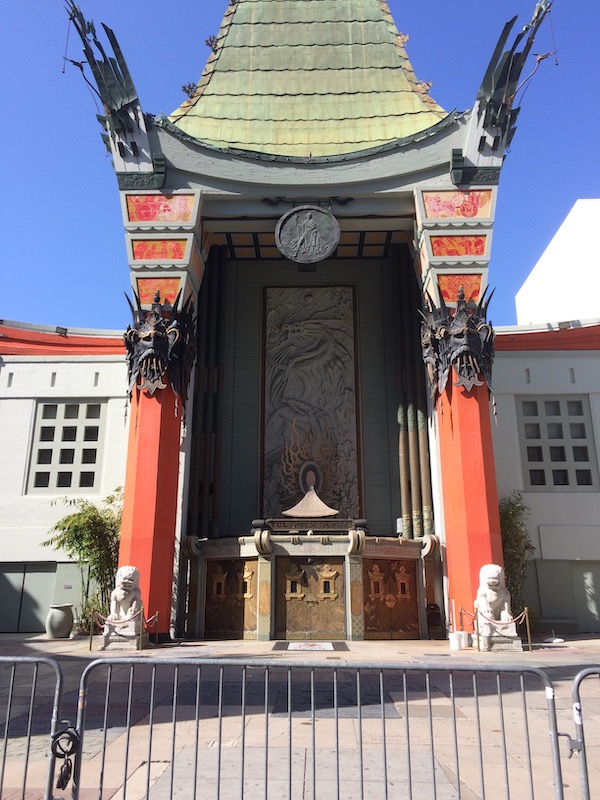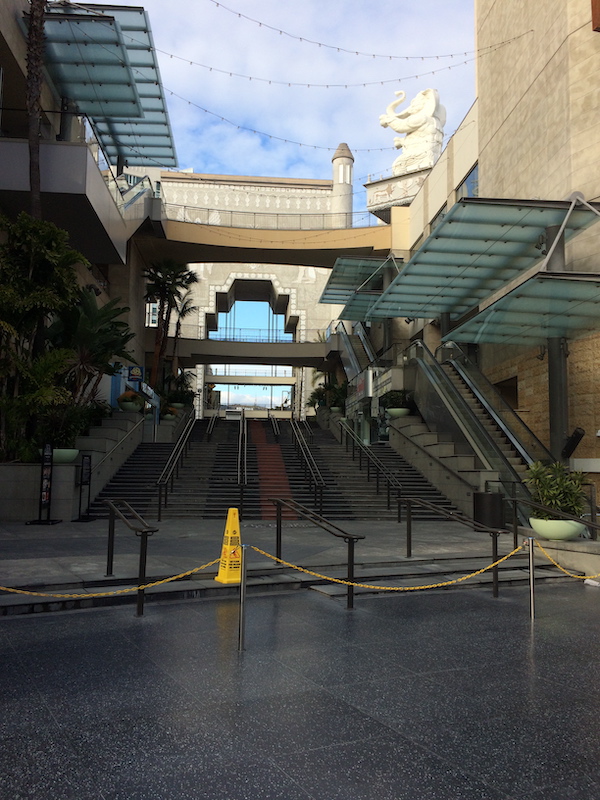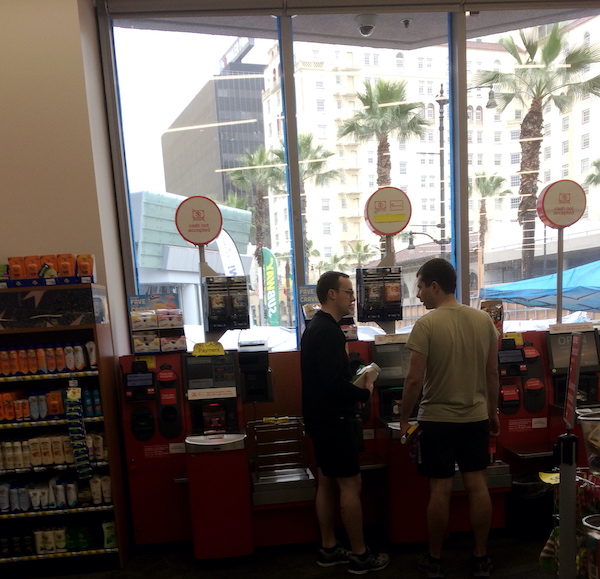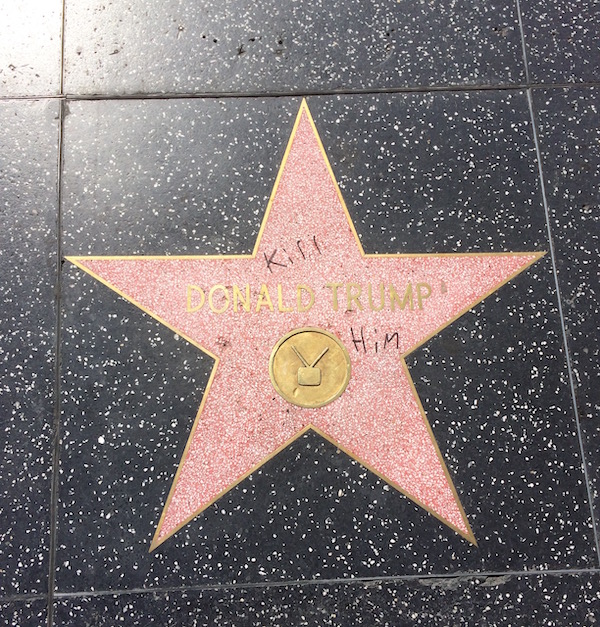I went to my local pharmacy megachain to buy a thermometer last month and I saw Pete Buttigieg and his husband at the self-checkout. For a few days I was puzzled by my own puzzled feeling about seeing them. I recalled reading on Twitter that Pete was hosting Jimmy Kimmel, which films nearby, and I couldn’t remember and didn’t care whether he’d been on already and was just hanging around visiting the city or if the hosting was yet to happen. He was out of place, and I decided it was what he was wearing. America only knows Pete-in-a-McKinsey suit. But there he was in shorts and a T-shirt, just blending in with tourists on Hollywood Boulevard.
But then the days changed quickly. Instead of brushing past tourists and street performers and vendors’ carts now, they are all somewhere else and I mostly stay home. The most faithful sense through which to know my neighborhood is hearing. It teaches me what is changing and what is lost and what is gone. Lost and gone are different—the missing traffic and tourists are not missed and are not gone, but waiting, and the absence is tense. Tense because the slackness of this peace is an unsustainable luxury. The birds trading solos on a quiet morning, the empty space around them, all on loan. Every hour now, I can hear the church bells at Highland and Franklin. I say “can” because it has fallen somewhere in my control: I do not always hear them but they are always audible. In heavy traffic, which used to be most of the time, I could only hear them once in a while.

Late at night the only engine I hear is a motorcycle, racing itself. The other sounds—helicopters, sirens—are not rhythmic, though they are repetitive. From people in New York I have learned to hear sirens that I used to tune out, from habit. Now I hear them and think: Oh.
I used to play a game with myself, guessing what time I woke up in the morning by the way the light looked. My neighbors installed several bright security lights to watch over the expensive cars in the parking lot of their members-only club, shortly after I moved in. My apartment and its windows face this lot directly so I can’t enjoy the evening light or my view after dark, as their security system floods the small apartment even from half a block away. Shortly after I moved in last year I learned I couldn’t play the what-time-is-it game anymore and instead I wake up to a sort of grayness that could be a cloudy dawn or a sunny noon.

I asked my apartment manager to talk to them but it didn’t go anywhere and I gave up wanting to agitate and so I started a new game to know what time it was: I listened to the traffic. If I could hear cars moving, that meant I was up early. Franklin Avenue is a corridor of exhaust that is bumper to bumper from La Brea to Highland, as everyone makes their way onto the 101 freeway, and the only time you hear cars actually moving is before 7:15 AM. If I heard cars moving, I knew I could snooze for a few minutes.
The quiet is so misleading and makes everything feel strange, because the city has not “slowed down.” There is perhaps more uncertainty now than everyone alive has ever faced; this time of high-stakes, high-velocity change leaves nothing but room for catastrophic error. The governor, Gavin Newsom, has branded all collective efforts as “meeting the moment.” People are mad as hell at LA’s mayor, Eric Garcetti, for not cancelling the Los Angeles Marathon, held March 8. I remember it as my first day of isolation because the route passed right by my block so the night before I’d decided, “Nope. Not leaving the house tomorrow.” And I felt like an outlier.

It was almost a week later that I saw Pete and Chasten and it’s taken me until this morning to realize why they were out of place. I went home and did my laundry and later that afternoon a friend and I would cancel our dinner plans, “to be safe.” Pete was 8 feet away from me in the same space and time, and if he was afraid, he—with his options and resources—should have been home. So: Was I wrong to be afraid, then, or was he wrong not to be?
Last week I could hear a cat in heat below my window. I passed this news along as neighborhood gossip to my friend, who texted back with a picture of one of the baby squirrels who visit her bedroom window.
Someone who lives nearby was playing Amy Winehouse over the weekend (We only said goodbye with words/I died a hundred times). It was far enough away to sound faint in my apartment. I wondered who was playing it, where they were, if they could please turn it up a little, her ache still raw at any volume.

Every so often this past year I’ve heard a guitar player, maybe a Musicians’ Institute student. He plugs in and strums a little bit of noise, at full volume—all distortion—and he plays just enough until we unseen neighbors are about to gather up our voices and shout him down—and then he stops. I wonder if he likes to annoy us all—just a little—with his soundcheck before getting on with some long rehearsal in his own ears, turned up to 11. He seems to know just how much we will stand, as good neighbors. Like he announces that he exists—like a tap on the shoulder—and we notice but as we turn around to react, he runs away.
I saw a guy last year parked on Hollywood Boulevard standing on the roof of his car, amplifier hooked up to his own car battery. Maybe it’s the same guy. I thought it was brilliant: All the time I spent on the Strip, I’d never seen anyone do that until 2019. I haven’t heard guitar-neighbor lately so it’s an open question in my mind: did he go back home somewhere—like some of my neighbors seem to have done, by the looks of our half-empty parking lot? Or maybe he just doesn’t feel brash, doesn’t need to fill up our space right now.
Someone just knocked on my door. I guess it was the UPS guy but by the time I opened the door the package was there and he was already down the stairs and out of sight. I called to him: Thank you! And I heard him say: You’re welcome! From his voice he sounded like the same guy who delivered something here last week. Last week I answered fast enough to see him walking away.
I usually work at home anyway and often I am transcribing. This is how I pay my rent; how I will, hopefully, continue to pay my rent. When I put my headphones on I am not really in a place anymore, I enter aural-only space where researchers ask questions, mostly of executives. They want to understand businesses and industries, want insight into former bosses. Someone’s former CFO is someone else’s next CEO. Someone’s asshole boss might be a hedge fund’s dream come true. This private research goes on almost every day, year in and year out, and it helps investors decide what to buy and what to sell. That is all it does. Working for this client has been an education in what is a good company and what is a bad company, as well as who decides.

The dots that connect an investor to a researcher to a subject and an eventual phone call land in my inbox as a link to an audio file. I listen to every word and type most of them, taking out pause words and cleaning up messy stream-of-consciousness, imposing coherence on the questions and the answers. The work is tedious, and given the glitchiness of cellphones and VoIP and the tendency of people to mumble, chew, type and cough as they talk, also stressful—so I take lots of breaks that feel like coming up for air but not quite resurfacing into the kind of full existence that includes body or place. I hold myself in suspension within the 2D framing of the Internet and tweet and read news and then go back under, submersed in executives. Everything about their world is in the voice: the tone, the mood, the intelligence, the ego, the blind spots, the quality of the conditions of their life. They are always less stressed out than I am, and I know their lives don’t look like mine.
What frightens me today is that wherever they are, however comfortably seated, now the executives discuss Covid, too. What is outside my window is inside my headphones. What frightens me now is that all discourse is one—the world narrowing to a single thought. Pete in his shorts; Amy Winehouse; the quick, sharp knock on my door. And the sole motorcycle, racing itself.
The silence doesn’t mean what it usually means, a presence of traffic. But it doesn’t mean its opposite, either. By the millions we have consented to change our lives and to make room for those heroes still going to work, still trying to save us, to save themselves. Everything everywhere is this one conversation; we are all determined to meet our moment the best that we can.
*April 1, 2020, California: 171 dead, 1,855 hospitalized, 8,155 positive, 87,692 tested, 57,400 tests pending (source: covidtracking.com).
